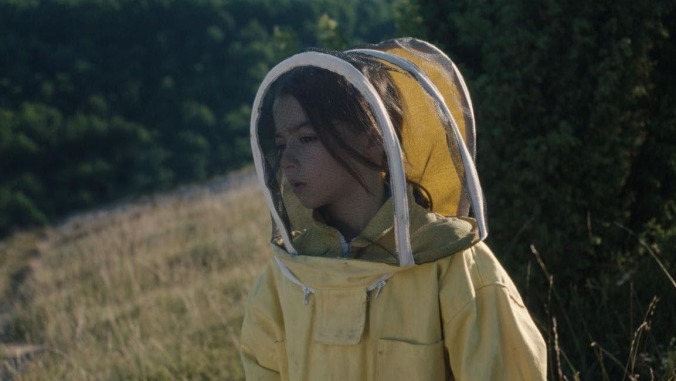It’s heartening that we have now reached a point where transgender issues have risen to the level of awareness that a film like 20,000 Species of Bees can find an audience. In focus here is the process of self-discovery that many trans kids undergo, with all the fear and rejection that can come with it. Writer-director Estibaliz Urresola Solaguren is not herself transgender, so there are limits to how deeply she can explore those feelings through this story, as her understanding of the emotions at play comes from a place of empathy rather than experience. However, rather than leaning into that inexperience, Solaguren smartly doesn’t craft a central arc out of her young lead’s emerging identity, instead focusing on how her family responds to the realization.
Cocó (Sofía Otero) is eight years old and slowly realizing that she isn’t like other boys, secretly thinking of herself as Lucía. (Cocó is a nickname she begrudgingly accepts in place of her birth name, which will not be used in this review.) When her mother Ane (Patricia López Arnaiz) takes her and her two siblings to the Basque countryside to spend their summer vacation with their grandmother Lita (Itziar Lazkano), Cocó starts to become more withdrawn, observing women’s spaces with an inarticulate sense of longing. It’s only in spending time with her great aunt Lourdes (Ane Gabarain), tending a colony of kept bees, that Cocó starts to relax and let some of the real Lucía out of her shell.
Otero is the lynchpin upon which the entire film relies, so it’s heartening to see such a measured and powerful performance from someone so young. She reportedly worked in collaboration with Naizen, an association for families of transgender minors, to properly explore the emotional spaces Lucía needs to navigate, and the effort shows. There’s a fine line to the performance: She needs to be increasingly certain of her own identity without putting that realization into more than a few scattered words at a time, as the prevailing concerns become less about who she is than how her loved ones will react. Given Solaguren’s naturalistic direction that’s light on explicit exposition, this is a tremendous feat, even if it places us at something of a necessary distance from Lucía’s innermost developments.
But that distance is compensated by 20,000 Species of Bees positioning itself as a family drama, with Ane’s journey toward accepting Lucía as her daughter forming the backbone of the narrative. Steering away from tropes of direct bigotry that are only hinted at by Ane’s mother, 20,000 Species of Bees’ script shows Ane as a modern, progressive parent, embracing the conclusion that there is no division between “boy things” and “girl things,” resisting the pressures to box children into predetermined, gendered roles. However, she is in a state of denial about the increasingly obvious signs that Cocó is not the boy everyone imagines her to be, and it is Lourdes’ supportive nudging that opens her up to the possibility of accepting her child for who she is. Considering that the primary audience for a film like this is progressive adults, this kind of arc is much appreciated as a confrontation of prejudices that many may not realize they harbor, especially when they have a vested interest in the identity of their own children.
If 20,000 Species of Bees has any overt flaws, they are to be found in its pacing and relative lack of depth. Too much screen time is devoted to Ane’s struggles as an artist and her decaying marriage, establishing that she is distracted from Cocó’s cloistering emotional state to an overly distracting degree in its own right. Focusing on the wider context of the entire family proves something of a double-edged sword, as Lucía’s siblings aren’t terribly well-developed as characters, while Lita and Lourdes act as standardized examples of rejection and support, respectively, by which we contrast Ane’s mindset. As well-performed as Solaguren’s script is, especially by Otero, it’s hard not to see the rigid bones of formula holding this story together.
However, it’s equally hard to deny that Solaguren has been successful in her goal of exploring the way a transgender child’s identity affects their family and, indeed, affects them in turn. Despite its limitations, 20,000 Species of Bees is crafted from a place of empathy so often lacking in conversations about trans childhood. (Just look at the last two years of Republican anti-trans posturing and tell me I’m wrong.) One can only hope that it inspires empathy in turn, and perhaps a few trans kids will have an easier time growing into themselves.


 Keep scrolling for more great stories from A.V. Club.
Keep scrolling for more great stories from A.V. Club.